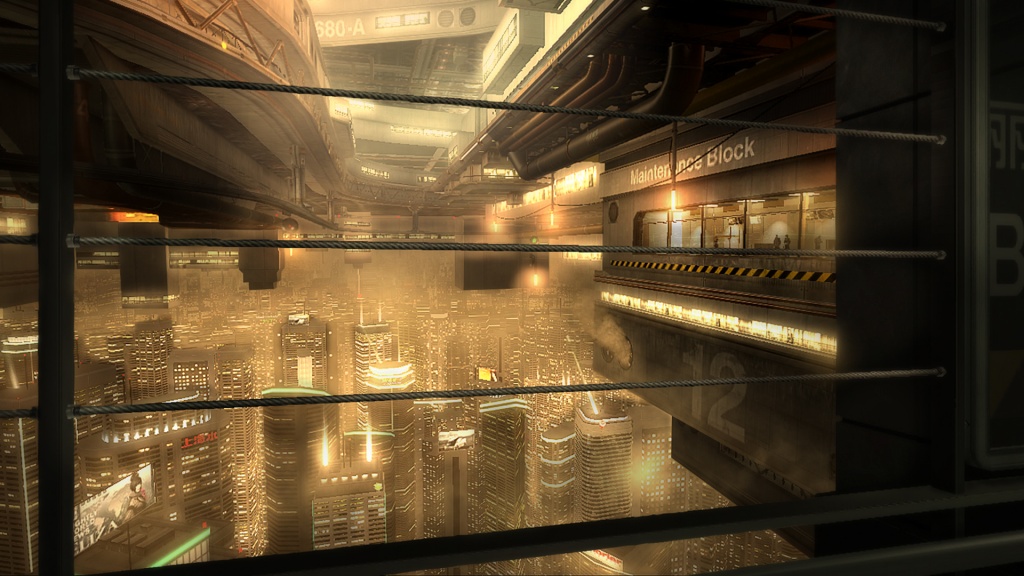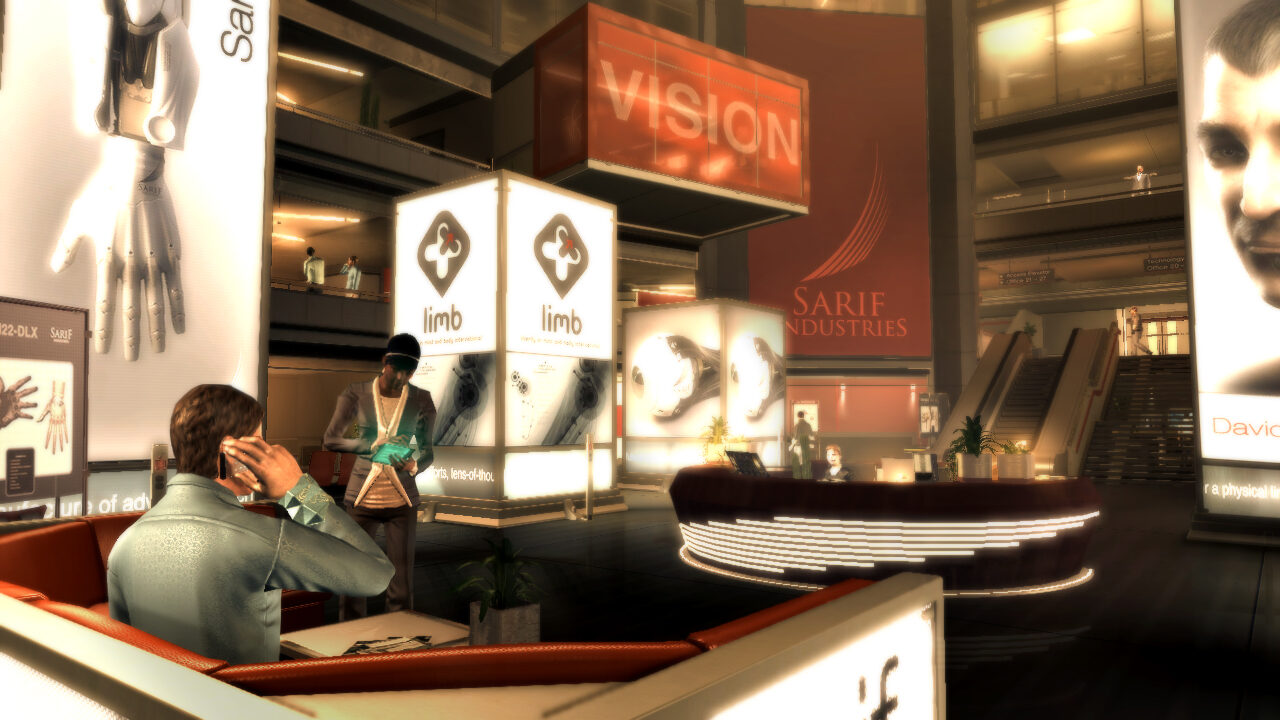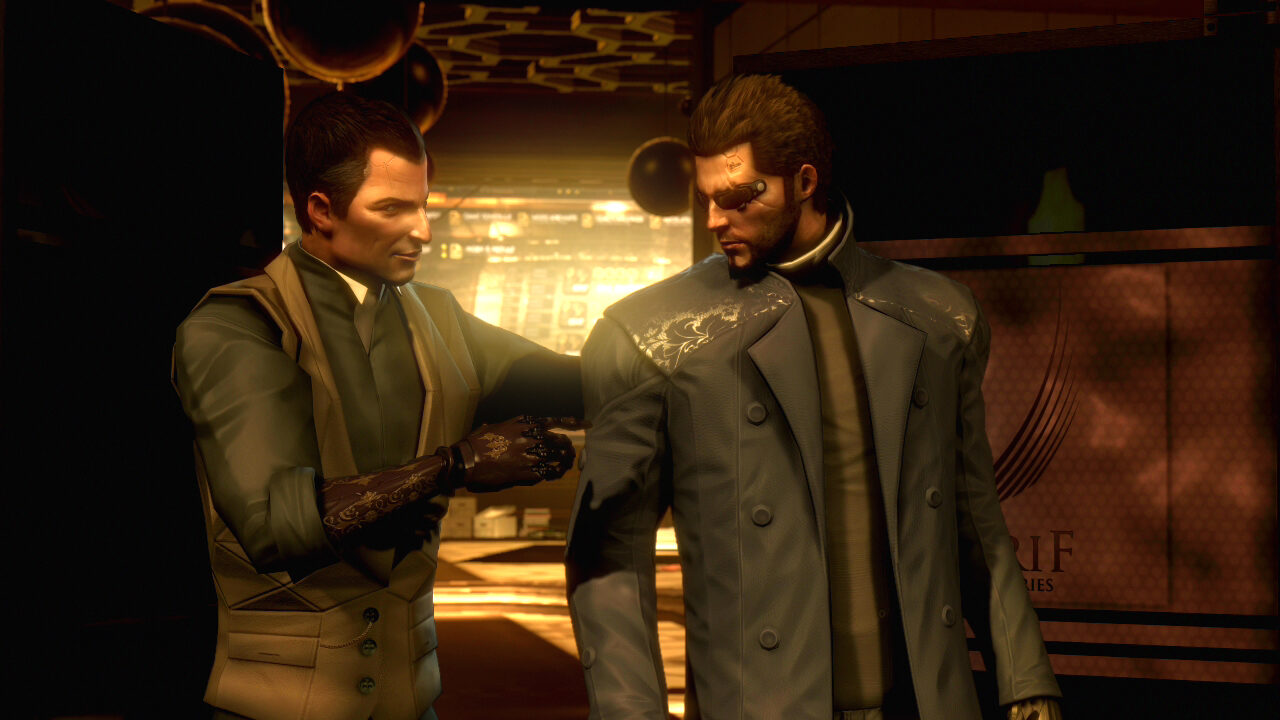In 2011, Deus Ex: Human Revolution revitalized a franchise, garnering heavy praise yet alienating fans of the original who sought a faithful “immersive sim” follow-up. Two years later, Deus Ex: Human Revolution Director’s Cut launched to PC and all current consoles, including the series’ first foray into Nintendo territory (Wii U). This Director’s Cut added the standalone Missing Link DLC into the full product, refined some key dialogue and boss sequences, and cleaned up some other loose ends with combat and animation quality. In my opinion, it’s the definitive version of the game to play.
Regardless of the version you’re playing, however, questions remain: did this game stand the test of time? How does Human Revolution fare when playing it in the year 2025?
Honestly, I’d say it’s pretty swell! Mission-based action RPGs have certainly grown as a genre since 2011, so at times, I find myself imagining alternative mechanics and branching narratives that would make for a better experience today. Nonetheless, I enjoyed my brief return to Detroit, Hengsha, and Panchaea.
As I explored the world of DX:HR, I couldn’t help but think of the timeline built by this franchise. The original Deus Ex takes place in the year 2052. As a prequel, Human Revolution jumps back to 2027. Among the settings in this gritty dystopia, few predictions have come to pass. Mechanical and neurological augmentation is largely hypothetical and nothing like the unregulated mess and us/them dynamics of this series. Though we have anti-vaxxers in our post-COVID world who refer to themselves proudly as pure bloods, the idea that an mRNA vaccine is tantamount to a visit to a DX:HR LIMB clinic seems laughable to me.
Additionally, much as large language models boast impressive features and can serve as useful tools, I don’t think ChatGPT and its ilk can hold a candle to the global media-controlling AI, Picus Media’s Eliza Cassan. If we move from LLM to AGI in the next two years, I’d be shocked.
There is also the cute reference to Final Fantasy in-game. DX:HR came to us after Square Enix acquired Eidos, so the team was able to pull a few fun references. You may run across a poster for a Final Fantasy XXVII within the game’s environs, . Yes, that’s right, twenty-seven. Square Enix is ten entries behind the aggressive fictional timeline.
My desire to analyze the game’s timeline and prognostications derives from the game’s poignant insights into the human condition. Though critics over the years have chided the game’s narrative for waxing philosophical and on-the-nose preaching about humanity’s perch on the precipice, I found myself enjoying the tale told here more than memories of my first playthrough (in 2013) suggested I should.
Beyond the grand narrative, there are the smaller stories, the character interactions, the chapter arcs and side stories. I find myself particularly drawn to the iconic voice of protagonist Adam Jensen, portrayed by Elias Toufexis. And I’m not talking about the meme-worthy line “I never asked for this,” though that is undoubtedly a great delivery. Toufexis’ delivery is at its best during the lengthy persuasion dialogues, with my favorites being the interactions between Jensen and his boss, David Sarif (voiced by Stephen Shellen), and the climactic dialogue between Jensen and Hugh Darrow (voiced by Arthur Holden). Somehow, these dialogue sequences are more impressive to me now than they were in 2013. The dialogue and the delivery stand apart from most sci-fi and fantasy games and are on par with Geralt of Rivia (Doug Cockle) in The Witcher and Clive Rosfield (Ben Starr) in Final Fantasy XVI. If you’re wondering how I determined a sound subscore above 90%, it wasn’t just the music. In fact, much as I appreciate the Deus Ex: Human Revolution Original Soundtrack, I think it is precisely the voice acting that elevates the listening experience.
As an aside, I’ll note that I saw Toufexis’ name crop up in my most recent watch on Netflix: season 3 of Blood of Zeus. I’d forgotten that Elias Toufexis plays the role of Seraphim, one of the lead characters in that show. He did a great job there, but in my mind, Toufexis is inexorably linked with the voice of Adam Jensen.
Graphically, DX:HR holds up fairly well for a game released the same year as Skyrim. One thing that strikes me about the visual experience in 2025 is that the pre-rendered, recorded cutscenes sometimes look outdated compared to the in-game graphics if you’re playing at the highest settings with a high-end PC. In the realm of PC gaming, it’s understandable how this can happen, but even so, I imagine it’s somewhat rare.
When I put the intricate story aside and focused on the mission ahead of me, I found the game just as fun and enjoyable as I had long ago. Yes, the “stick-to-wall” phenomenon with taking cover can feel a little clunky. But once you get used to it, this is a great game for stealth experience. I should note, when I first played, I went after all of the achievements, requiring multiple playthroughs with differing goals. A pacifist playthrough was hard enough, but for my money, the greatest challenge was Foxiest of the Hounds, a stealth-related achievement for never tripping any alarms or allowing any guards to activate alarms. Back then, I found this achievement a frustrating-but-fair experience. This time around? I gave it a go in the first two combat settings, then switched up to a sort of berserker play mode, the opposite of stealth. This approach only works on the easiest difficulty setting, but it was a great deal of fun!
I had forgotten just how big and how small DX:HR was — environs that feel an inch wide, though the player can dig a mile deep. The game’s first open environment is the city of Detroit. You have limited access across a relatively small area, though there is something to be said for traversing different heights as well. Alongside the main quest, you gain access to sidequests through various means, and it’s all tracked conveniently in the game’s menu. As you change from one area to another (Hengsha, Montreal, etc.), sidequests expire, so those interested in seeing everything the game has to offer need to prioritize the sidequests over the main story.

At the end of the day, I think Deus Ex: Human Revolution remains a great experience, one worth returning to all these years later. However, the caveat remains: if you’re looking for a game that plays like the first Deus Ex, that is not what you’re going to find. This is a carefully crafted narrative title with relatively few degrees of freedom in puzzle-solving, combat, or autonomy in crafting the story. I am a fan of YouTube content creator hbomberguy, and his 3.5-hour video on DX:HR from 2022 is one I’ve watched several times over. I highly recommend it, as it provides background and insight on the game’s development and outcomes compared to its predecessor. However, I would push past his conclusion that DX:HR is merely “fine.” I think it’s still a great game to play, but you just have to know what you’re into and temper your expectations. An immersive sim, this is decidedly not.




